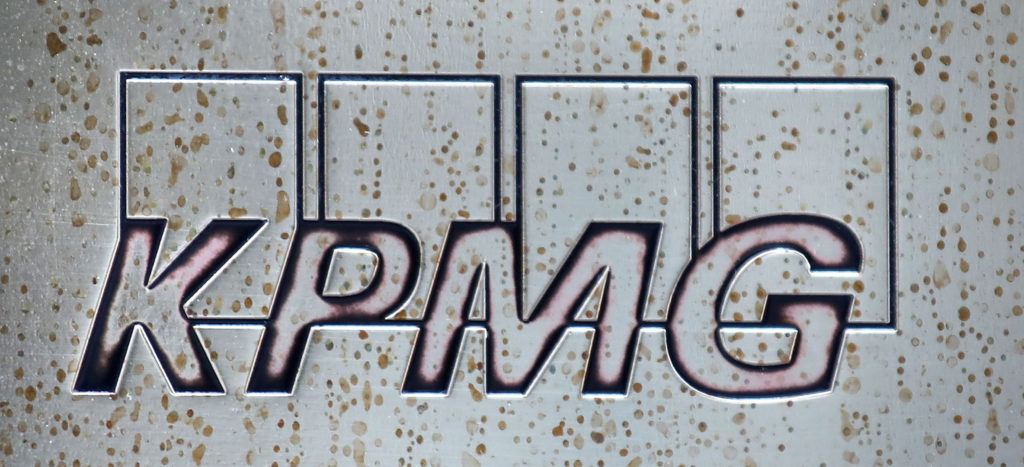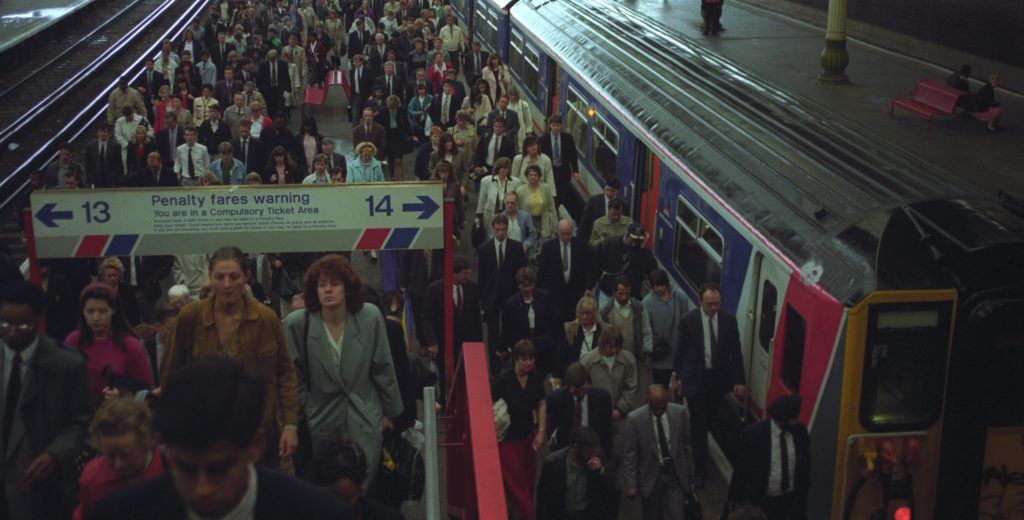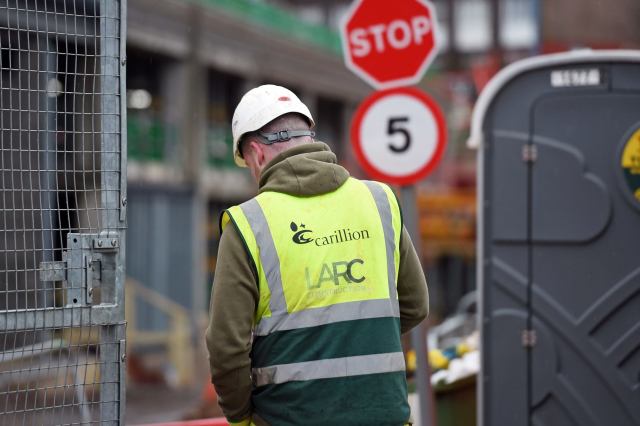Credit: Joe Giddens/PA Wire/PA Images

The collapse of the UK’s second-largest construction firm is, by any measure, an important business story. Yet this week’s demise of Carillion also threatens to upend British politics, and could have policy implications that are felt far beyond these shores.
Carillion employs 20,000 in the UK and another 23,000 overseas. As recently as last July it boasted a stock market valuation of some £2 billion. Now, after the share price collapsed, and shouldering a £1.5 billion debt burden and whopping pension deficit, Carillion has gone into liquidation.
The collapse of such a large company matters – not least given the number of employees affected, and the knock-on impact on the thousands of subcontractors and other suppliers owed money by the group. The reason this Carillion collapse is really reverberating, though, is because it has reignited a political debate in the UK that, for several decades now, appeared to have been resolved.
That’s because Wolverhampton-based Carillion had emerged as the flagship among a select group of huge private sector outsourcing companies that, initially during the early 1990s under the Conservatives, but particularly since the subsequent Labour governments of Tony Blair and then Gordon Brown, have been awarded lucrative contracts to deliver all manner of public sector projects and services.

From building hospitals and schools to modernising the National Health Service, running prisons and even providing school meals, these behemoths have their fingers stuck in many government pies. Carillion, alone, when it collapsed, had 450 government contracts on its books, worth £1.7 billion.
Now the company has imploded, folding under the weight of debts so heavy and contracts so toxic that administration and a possible rescue plan was not even worth considering, the Government’s Official Receiver choosing to dismantle Carillion instead. This is a public relations disaster for British commerce – and comes only weeks after Richard Branson’s Virgin Trains and its partner Stagecoach handed back the East Coast railway service to the Government, at a potential £2 billion cost to taxpayers.
These two debacles have not only left Theresa May’s government looking incompetent, at a time when the Prime Minister and other senior players are embroiled in the UK’s Brexit negotiations. This double private-sector failure has also emboldened Labour leader Jeremy Corbyn, and others on the far left who think capitalism is inherently unjust and the only answer is a wholesale renationalisation of public services and a broader reassertion of the state.
“It is time to put an end to the rip-off privatisation policies that have done serious damage to our public services and fleeced the public of billions of pounds,” declared Corbyn, via a slick video clip that appeared very soon after news about Carillion emerged, and was widely distributed across social media, with the key message:
“The collapse of Carillion is a watershed moment.”
The fact is that Corbyn’s outrage is warranted – even if his proposed solution, the nationalisation of vast swathes of commercial activity, is dangerous, utopian nonsense. The manner in which hundreds of UK public-sector construction and outsourcing projects have been managed over recent decades has indeed been scandalous.
Under the so-called Private Finance Initiative (PFI), successive governments signed hundreds of long-term contracts to construct, service and maintain schools, hospitals, infrastructure and other public buildings. The government pays back investors over 30 years or more, after which the buildings revert to the state – but, crucially, with much of the borrowing being done by the private sector, keeping it theoretically off the state balance sheet.
Gordon Brown, Labour’s self-styled “iron chancellor” was particularly keen on such “risk transfer” during the decade leading up to the 2008 financial crisis. The PFI, in which Carillion became a major player, as it acquired established construction firms such as Wimpey, Tarmac and Mowlem, allowed Brown to be seen providing the funds for countless new schools and hospitals, but with the related financial chicanery flattering official borrowing figures. This was important, given Labour’s well-deserved reputation, established during the 1970s when the UK needed an International Monetary Fund bailout, for running up disastrous public sector debts.
Even then, it was clear to some of us that what Brown called the “the biggest public building programme since the war” was based on a gigantic – and controversial – hire-purchase scheme. PFI companies began making double- and sometimes triple-digit returns on capital, as they re-financed projects once construction had been completed, often outrageously refusing to share related gains with the Treasury.
And because the private sector pays more to borrow than the state by definition, the much-cited “rigorous and objective value for money test” that supposedly underpinned PFI was always cynical nonsense. This was a scheme that allowed and continues to allow ministers to be photographed opening shiny new buildings, while keeping much of the capital spending off the government’s books – so value for money tests were effectively rigged. That’s why from 1997 to 2003, the first six years of Blair’s Premiership, PFI was used for 90 of the 100 hospitals built or refurbished under New Labour and 500 out of 550 new or renovated schools.
These were the years during which saw the entrenchment of the lax procurement procedures and culture that produced Carillion, which was founded in 1999. As well as making huge profits from leasing new buildings and infrastructure to the government, Carillion and the other PFI giants boost their returns with lucrative service contracts – charging local authorities and NHS Trusts extortionate amounts to carry out simple maintenance, renovation and alterations, often under the cloak of “commercial confidentiality”.
Carillion’s 2016 annual report boasted that the dividend paid to shareholders “has increased in each of 16 years since formation of company”. While the company existed, it also paid many millions in executive bonuses, while running up a pension deficit of over half a billion pounds – largely off the back of taxpayer-funded contracts.
As well as building schools and hospitals, Carillion’s portfolio has expanded to work on the HS2 fast-rail link, redeveloping Battersea Power Station, building the Aberdeen by-pass (Scotland’s largest construction project) and maintaining 50,000 army base homes for the Ministry of Defence. The company also has extensive operations in Canada, the Middle East and the Caribbean.
‘Over-reach’ has clearly been part of the problem. Carillion’s incessant appetite for expansion saw it pursue too many risky contracts – some accompanied by questionable accounting practices. In the fierce scramble for business among the UK’s PFI giants, Carillion also began over-promising on the work it could do for an agreed cost. And when it failed to deliver on time and on price, as with the new 646-bed Royal Liverpool hospital, for instance, the company ramped up borrowing even more.
Carillion had been fighting for its life since last July, when it warned it was losing cash on key contracts and debt was rising, leading to the departure of CEO Richard Howson. Having received £1.5 million in pay and bonuses in 2016, Howson somehow secured an agreement for his £660,000 salary to be paid until October 2018. Last autumn, five banks agreed an additional £140 million in loans but, with the company burning cash and facing massive contractual problems, creditors last week refused to pour more good money after bad. Leading British lenders including Barclays, the Royal Bank of Scotland and Lloyds Banking Group now face the prospect of hundreds of millions of pounds in outstanding loans going unpaid.
The UK government, then, isn’t bailing out Carillion. Shareholders and most creditors will sustain large losses, while the company’s pension liabilities will fall squarely on the Pension Protection Fund, which is financed by raising a levy on the functioning pension schemes into which millions of workers contribute.

There are, though, numerous questions for the Government and Carillion’s directors to answer:
- Why did ministers and civil servants agree to hand Carillion no fewer than eight lucrative contracts AFTER last July’s profits warning?
- Why did KPMG sign off on Carillion’s 2016 report and accounts, published at the end of March last year, just months before the company issued that warning?
- Was Carillion truthful when, in December 2016, it told financial markets that the company’s performance was “meeting expectations” and that it expected “strong growth in total revenue and increased operating profits”?
- While refusing to re-finance Carillion, how much will government end up paying for the cost of receivership and the re-tendering of countless, often very complex contracts?
The really unknown, though, relates to the broader debate about the role of the state – and the private sector’s role in the provision of public infrastructure and services. While PFI was championed by both the Tories and Labour, Corbyn himself obviously comes from the branch of his party that never accepted the “Blairite” revolution and which is now, after key internal party elections, very much in the ascendency.

The truth is that state-only procurement, with work being done by massed ranks of public-sector builders and technicians, is a recipe for massive inefficiency and corruption. The state already employs over 20% of the UK workforce – which is more than enough. And long before the ghastly PFI, the use of private sector contractors to build schools, hospitals and roads was commonplace – albeit without the opaque mingling of public and private balance sheets and the related over-priced service contracts.
There was also no golden age of nationalised railways in the UK, as Corbyn would have his legions of younger voters believe. During the 1960s and 1970s, state-run British Rail was a national joke, beset by endless inefficiencies, delays, cancellations and frequent industrial action. The UK’s part-privatised railways are now far from perfect, but they carry more people than ever before and are unrecognisable better than when British Rail prevailed.
Having said that, this Carillion debacle does raise very serious questions – which the Government and the various commercial interests embroiled in this saga must now answer. And let this collapse lead to changes that bring an end to the excesses of PFI, as some of us have long demanded.
For PFI is a public-sector rip-off, a wheeze that has allowed myopic politicians and devious contractors to construct shoddy high-cost buildings, while providing grossly over-priced services – all of which is short-changing the taxpaying public. PFI is giving the private sector, and capitalism more broadly, a bad name – and that’s why it’s got to stop.










Join the discussion
Join like minded readers that support our journalism by becoming a paid subscriber
To join the discussion in the comments, become a paid subscriber.
Join like minded readers that support our journalism, read unlimited articles and enjoy other subscriber-only benefits.
Subscribe